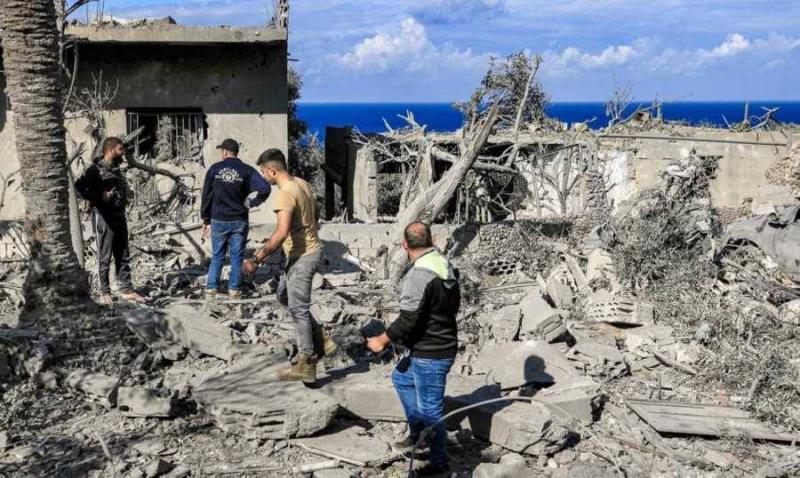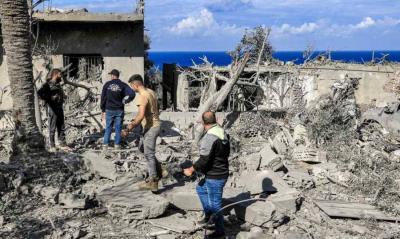The difference between dialogue and consultation is not clear. The rejection of the logic of dialogue or consultation for reasons related to the presidency or any other reasons is also not understood. During his recent visit, French presidential envoy Jean-Yves Le Drian introduced the principle of consultation prior to calling for a session to elect the president. He aligned with the opposition's demand but did not provide answers regarding the difference between consultation and dialogue, choosing to avoid any terminology that might provoke the opposition. He also rejected the principle of Hezbollah's insistence on the nomination of Sleiman Frangieh, head of the Marada Movement, for the presidency. He was unimpressed by what he heard about Hezbollah's refusal of any dialogue or consultation that does not involve the Speaker of Parliament, Nabih Berri, and was surprised by the party's reaffirmation of its commitment to Frangieh's candidacy. His visit concluded with no progress, mirroring the situation of the quintet committee, which froze its meetings after recognizing the impossibility of response and the regression of efforts that were being made to elevate the discussions to a ministerial level as reported by "Nidaa al-Watan".
Despite being open to relations with France, Hezbollah showed discomfort with Le Drian's efforts and his manner of speaking. Developments related to the situation in the south have demonstrated that any presidential endeavor is unlikely to succeed at present, as long as the southern front remains heated. Sources knowledgeable about Hezbollah's position assert that all those pursuing the presidency have resigned themselves to a natural linkage between the presidential elections and the fate of the war in Gaza, and consequently, the southern front. Hezbollah has sensed an American acquiescence to this reality, and Speaker Nabih Berri is operating based on this. This can explain the coldness in interactions with Le Drian, who arrived as an advisor and left as a warning; neither approach had any effect.
The "Duo" responds to internal initiatives, whether those launched by the Progressive Socialist Party, aimed at opening channels for dialogue, or those being worked on by the Free Patriotic Movement and its leader, Gibran Bassil. The latter aspires to achieve a convergence with the Socialist Party and some of those pursuing the presidency to form a nucleus of a bloc that advances dialogue and secures presence in parliamentary sessions. Such a step could pave the way for the recent Qatari endeavor aimed at reviving presidential discussions. Qatar has sent reassuring messages through delegates, promising that it will contribute to the reconstruction of what the Israeli assaults have left behind in the southern villages and towns. For the first time, political sources have expressed optimism regarding the renewed Qatari efforts, even though they are cautious about revealing the details of what is being discussed. Other sources hinted at a possible divergence between Qatar and Saudi Arabia, which may have frozen the meetings of the quintet committee.
In Hezbollah's view, all presidential initiatives, including the Qatari ones, are attempts to buy time until efforts to reach a ceasefire succeed, or they are preparations for the post-Gaza period. If the war ends, U.S. envoy Amos Hochstein will return to present negotiation papers on borders and the presidency; if it continues, the focus remains on the highly active southern front, as evidenced by Hezbollah's recent confrontations, where it has begun to fend off warplanes with anti-aircraft systems and intensified its operations towards Israeli territory in response to ongoing assaults, most recently downing an Israeli Hermes 900 drone.
The United States is closely monitoring the southern front as it considers it a serious threat to Israel, acknowledging that this front will not cease as long as the war in Gaza continues. Therefore, it is exerting pressure on Benjamin Netanyahu to agree to resume negotiations, especially after the resignations witnessed within the Israeli military council, which had previously supported his decision to continue the war. For these reasons, the Speaker of Parliament is receptive to all presidential initiatives while keeping an eye on the American effort and envoy Hochstein, with whom coordination regarding the next phase after Gaza has not ceased. Securing credit for the decision-maker is preferred over the "Duo's" direction for others, which is why Le Drian's visit ended in failure, making discussions about elections on the heated southern front futile. While the confrontation is not a full-scale war, it represents a significant escalation that could shape the developments in the region, and based on this, Hezbollah is acting according to "Nidaa al-Watan".




